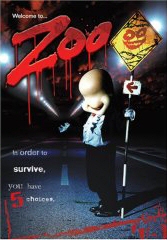
Written by Shortarrow Oikawa and directed by Hiroshi Ando, Zoo is a bold reinterpretation of the Asian horror anthology format. More serious than many of its ho-hum counterparts, and far more expressive, these stories strive for a maturity that feels organic, not forced, and exchange the by now cliché themes and visual symbols of the genre (long haired ghosts, cursed video tapes, etc) for more intimate and psychologically profound nightmares. Consisting of five stories, Zoo wastes little time on cliché, focusing on human characters with believable mental dilemmas and haunted pasts encountering the surrealistic and emotionally absurd in realistic settings that add to the terror. The result is a fresh, intellectually provocative collection focusing on terror caught somewhere between the mind and soul, flesh and ethereal.
The first entry, "Kazari," examines the dark potentiality of the modern family unit, dissecting it from within and exposing the very real and terrible emotional and spiritual damage that traditional family 'values' can exert on the individual. Taking a note from classical tragedy, this chapter stresses the dangers of favouritism, alienation, and parental abuse -- grim if honest themes for a subversive short -- one that leaves a sour taste. A mother of twin sisters, Kazari and Yoko, prefers one, mistreating and ignoring the other. This continues until the abused girl attempts to flee her abuse and, this being Asian cinema, things take a shocking turn, forcing us to re-examine our ideals and perceptions of right and wrong, loyalty and betrayal. The title of "Seven Rooms" sounds awfully similar to a Faerie or Folk Tale. Appropriate, considering the structure of events and themes ring with the awful clarity and deceiving simplicity of that traditional form of cultural nightmare. When a young boy and girl -- brother and sister -- find themselves in an isolated, small, dark concrete room -- they struggle to survive an evil both without and within.
In an existence where a majority of human kind (and human values) has already vanished, an alienated man struggles to gain personal understanding and some code of values in the science fictional "Hidamari No Shi." Lacking the intense and intimate horror inherent in the first two stories, this chapter feels more like the dystopian worldviews of George Orwell. This is something that all the stories share, suggesting an aura of dark fantasy and intellectually surreal rather than traditionally envisioned ghost stories. Such an experimental and bizarre approach is what raises it above other films of type. "So Far" embodies the very unease inherent in surrealism as an aesthetic genre and frame of mind, challenging its characters (and by extension our own) sense of real/fantasy, dream/waking life. Digging into the frightening foundations of the surreal, the script focuses on subjectivity, most importantly the nature and danger of individual perception, and how what one believes is real/false, or right/wrong, MAKES one's reality. Describing in its horrifying premise the power of, and our reliance on, personal perception, the plot features a young boy whose mother and father both believe that the other is dead. The boy's struggle to survive emotionally and intellectually in this nightmare of absurdity is undeniably frightening and unique. Unfortunately the unpolished sets, occasional sloppy camera compositions, and rather irritating acting hampers the effect of what could have been a genre masterwork. In fact, each story looses something of its power as a result of limited production values and direction that, while inventive, too often feels rushed. Despite such flaws, this entry is easily the most challenging and innovative of the collection, inspiring not only dread but awe -- that reverent sense of smallness and wonder that accompanies and feeds off of true terror.
Finally, in "Zoo," we have a murderer who kills a woman at an empty zoo, which gives its title and premise of conflicted reality/fantasy to the entire frame structure. As he takes photos of her body daily, the zoo (and his experience) slowly dissolves into a fragmented nightmare, reality washed into the shores of the darkly fantastic. This story of unreality washing over into the so-called 'real world' can be seen as a template for all the stories that proceed it, and captures the sense of unease and horror that the film as a whole attempts to achieve. The movie is admirable for this goal alone, as well as the aspiration of its emotional involvement, daring to tackle subjects outside of/beyond the average scope of the everyday horror film. However, because these ideas do deal with abstract ideas of reality, perception, intellectual fantasy, and expressionism, the film confuses as much as its engages, and will undoubtedly leave many people scratching their heads. For those who stick with it, and prefer their horror experimental, this show delivers in ideas if not always technologically.
Zoo is brought to us in 1.85:1 anamorphic widescreen. Despite some murky colors and an obvious low budget, the print is clean and pleasing. The drab colors fit in with the grim feeling of the stories, mirroring their morose atmosphere. Audio in Dolby Digital is clean and crisp, without any noticeable problems. Extras are sparse, featuring Trailers and a TV Spot. "Making Of" features for "So Far" and ""Seven Rooms" are also included. These, while appreciated, bring little of real insight or context to the table. That's okay, as the originality and emotional intensity of the film itself makes the disc worth purchasing.
Review by William P. Simmons
| Released by Tokyo Shock |
| Region 1 - NTSC |
| Not Rated |
| Extras : |
| see main review |